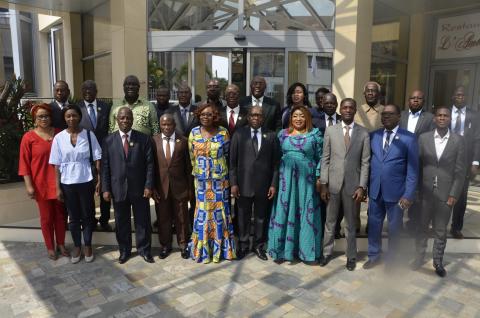
Abidjan, 4 December 2018 – The Ivorian National Chapter of the African Parliamentarians’ Network on Development Evaluation (APNODE-CI) launched the first parliamentary forum on the evaluation of public policies. The theme of the forum was “Evaluations for Human Rights, Gender Equality and Women’s Empowerment”.
The objective of the forum, which took place at the Tiama Hotel in the Plateau neighborhood of Abidjan, was to facilitate an exchange between parliamentarians, representatives of human rights organizations, academics, legal experts, gender equality advocates and entrepreneurs. The forum aimed to promote monitoring and evaluation (M&E) as an essential tool in improving the implementation of projects, programs and public policies in the areas of democracy, human rights and governance.
The forum brought together more than fifty professionals including around thirty parliamentarians, representatives from Côte d'Ivoire’s National Human Rights Commission (CNDHCI), the State Secretariat for Human Rights, the Ministry of Women, the Independent Development Evaluation (IDEV) at the African Development Bank, the Ivorian Initiative for Evaluation (2IEVAl) and the Ivorian Monitoring and Evaluation Network (RISE). The forum was organized in partnership with EvalPartners with the financial support of UN Women and 2IEVAL.
In his opening speech, the President of 2IEVAL, Mr. Samuel Kouakou congratulated APNODE-CI for having organized the forum and for its efforts to promote the use of evaluations in the National Assembly of Côte d’Ivoire and he invited the parliamentarians to take advantage of the experiences that were shared by evaluation practitioners. His speech was followed by that of the President of APNODE-CI, the Hon. Abbas Imbassou Ouattara, who thanked UN Women and 2IEVAL for their financial support. He also emphasized the important role parliamentarians can play in integrating the lessons learned from evaluations into policy and decision-making processes to strengthen good governance, respect for human rights and the promotion of gender equality.
Over the course of the day, there were three sessions followed by a Q&A. The first workshop was entitled: "the Universal Periodic Review (UPR) and the Role of Stakeholders" and was facilitated by Mr. Achille N’Djomou, Director of Human Rights at the State Secretariat for Human Rights. In his remarks, Mr. N’Djomou stressed the important role that parliaments can play in monitoring the implementation of the recommendations made during UPR process as well as its role in monitoring the actions of the executive.
The second event of the day was a panel discussion on "Evaluation of Gender-Sensitive Projects and Human Rights Policies: Issues and Perspectives", which was moderated by Mr. Samuel Kouakou, President of 2IEVAL. During his presentation, Mr. Kouakou highlighted the importance of evaluating public policies in relation to issues related to gender and human rights.
The third event of the day was a panel discussion on the "Practice of Public Policy Evaluation" delivered by Prof. Jose Carlos Assi Kimou from Cocody University and member of the CAPEC. During the session, Prof. Kimou provided parliamentarians with guidance on how to carry out their evaluation role and cited some practical examples of public policy evaluations.
Following these sessions, discussions were held between participants and panelists on various issues. These discussions led to a number of recommendations, including: the creation of a network of parliamentarians working on the promotion of human rights, the organization of regular training sessions for parliamentarians on human rights issues and the drafting of a manual on the evaluation of public policies.
At the closing ceremony, the Hon. Abbas Imbassou Ouattara, President of APNODE-CI, reiterated his thanks to the parliamentarians present and to all participants. He also thanked the donors who made the event possible, including UN Women and 2IEVAL, and concluded by asking MPs not to be afraid of evaluations, but rather to use evaluations as an instrument for improving the functioning of the public sector and its public policy interventions.
For further information, please find the report of the forum (French).

